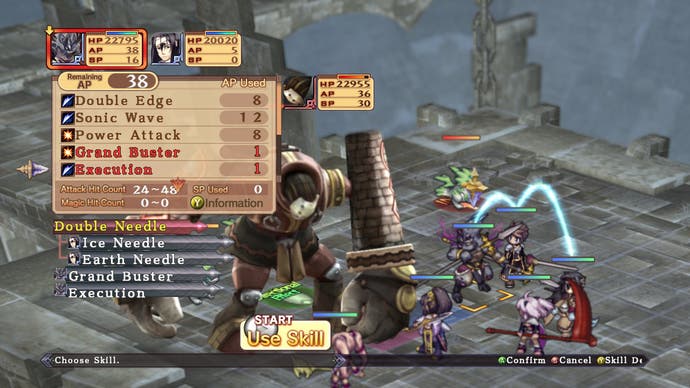Agarest: Generations of War Zero
Unnatural selection.
Beyond that, however, it's business as usual. Battles are divided between movement and attack phases, with the order of turns based on who has stockpiled the most Action Points. Flanking or attacking from behind causes more damage and healing in the field uses up precious AP.
It's all very flat, though. Literally, as the terrain is almost always a simple flat grid with few tactical possibilities. Since you can still unleash many attacks without being next to your target, questions of height advantage, or ranged versus melee attack, are rendered moot. A more robustly balanced game could have made something unique and interesting out of the chess-like challenge suggested here, putting the emphasis on co-ordinated movement rather than attack, but Agarest feels too vague and woolly to make the most of its potential.
Menus are stark and unhelpful, clearly designed with only the faithful in mind. And yet, those faithful are the ones most likely to feel déjà vu in a game that is almost entirely identical to the original, apart from new features like "Feel Link" and "Free Intention" - fancy names for what are essentially different ways to dress up and seduce your prospective brides. It would be slightly hypocritical to criticise a JRPG for doing something that even Western role-players have now embraced (is it really any different to all those people wanting Tali to be romanceable in Mass Effect 3?) but there's a subservience and possessive quality to the "relationships" in Agarest that feels more than a little icky.
Agarest then compounds its flaws with make-do presentation and an unforgivable reliance on the previous game's maps and mechanisms. Graphically it's a throwback to the PS1 era, but even this feels more like laziness than a deliberately retro design choice. The game is already two years old, having debuted in Japan in 2009, and it's based on a game engine that's two years older than that. Sluggishly paced and sorely lacking in actual tactical challenges, it really is hard to work out who, exactly, the game is aimed at.

Newcomers really don't stand a chance, since this is a game so insular and obtuse in nature that the developers at Compile Heart seem to have forgotten that some people may be new to the series, or even the genre. And yet fans are also being taken for granted and served the exact same recipe with a few grudging stirs of the spoon to make it look slightly different. At every turn, Agarest weakens its DNA by pandering only to those already invested.
There's nothing inherently wrong with sticking to what works, but it helps if the decision to cling to the past is at least made from a position of creative indulgence, rather than indifference. Agarest feels like the latter, a game that does what it does because there's no reason to try anything else. The tragedy is that in doing so, it embodies all the clichés that other games are trying to leave behind. You only have to widen your view a little, and take in sights like Valkyria Chronicles or Disgaea, to see how such an approach can only lead to extinction.
While these more ambitious examples set out for fresh waters, Agarest happily paddles in tiny circles around the most stagnant corner of a genre where rigor mortis is already setting in. That doesn't make it a bad game, per se - but it's impossible to recommend to anyone beyond its existing fan base.
